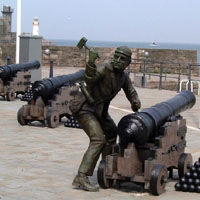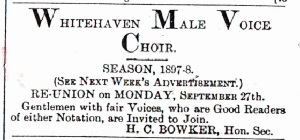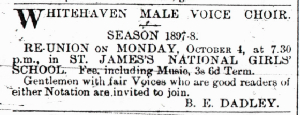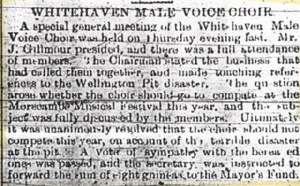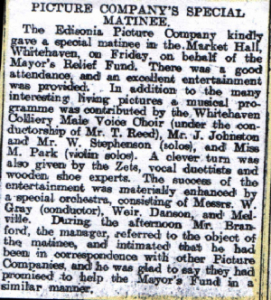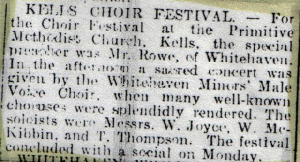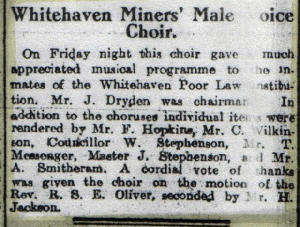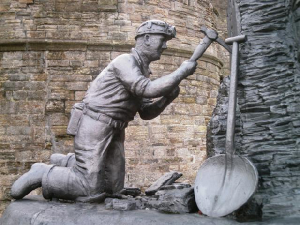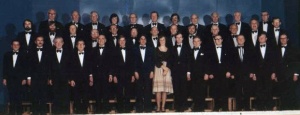A Brief History of Whitehaven
Whitehaven was a town built on coal, the industry that the monks at nearby St Bees first developed in the 13th century, although the town itself was planned and built in the 18th century. The town centre now is predominantly Georgian, although there is evidence of Italianate and Gothic architecture to be seen. It was the seat of the Lowther family, whose family crest was incorporated into the town insignia and which the Choir proudly wear as their blazer badge. The town is built on the foursquare grid system typical of Georgian towns.
The town has ‘tons’ of history, not all of it good. There are links with America, through George Washington (whose grandmother Mildred Gale is buried in Whitehaven) and John Paul Jones who was raised in the town, trained as a seaman and subsequently founded the American Navy, in a cruel twist of fate, he actually sailed his American ship ‘Ranger’ to Whitehaven in 1778 and attacked the town. There are also links with the slave trade, tobacco, sugar and rum. The wonderful coastline was once home to smugglers!
There is a history of shipbuilding, plus ancillary trades and the town was once the third largest port in mainland Britain after London and Liverpool.
More recently, the biennial International Maritime Festival has put Whitehaven firmly on the tourist map, attracting large numbers of visitors to the town and the creatively restored harbour.
Add to this the fact that at only half-an-hour away from the Western Lake District it can be truly thought of as a gateway to the past, present and future.
The Choir History
Whitehaven Male Voice Choir(s) prior to 1977
Whitehaven boasts a rich history of the Male Voice Choir movement. Printed in The Whitehaven Gazette on Thursday 6th May 1897 and recreated below is the first written record that exists as far as I am aware, about a Male Voice Choir in Whitehaven.
‘The above choir recently completed it’s first session and as one who had derived considerable profit and pleasure from attending the classes, I would like to recommend it to the notice of those interested in the study of Music and Singing. We were fortunate in having a teacher like the Rev. B E DADLEY, whom it is easy to see is at home in every phase of the subject; a most enthusiastic lover of music himself, he can’t help wanting to make others acquainted with the art and I understand that he has been remarkably successful elsewhere in the training of choirs. Mr DADLEY employs the tonic sol-fa method in teaching the elementary section of the choir and it has proved to be a most effective method in removing those obstacles in the way of the student of music. So much were they impressed by the value of this system of teaching, that nearly all the members who were entitled to call themselves “singers of some experience” attended the instructions given to the elementary division. Those acquainted with the tonic sol-fa system will be quite familiar with time, ear and memory tests, but some of us found when we had to encounter, say, the ear tests, that we had something to learn before we might hope to become singers according to Mr DADLEY’s standard. Whether the Whitehaven Male Voice Choir will ever consist of members, every one of whom will be able to sing at sight, with good quality of tone and the graces of expression, is hard to say, but that is the goal which the students are encouraged to aim at. Each practice night a portion of the time is devoted to study on the following parts of the subject:- correcting faults in voice production, with hints on the management of the registers and vocal exercises to improve the quality of tone. Singing at sight, voluntaries written on the blackboard by the teacher, with hints on the study of mental effects of the tones in the scale. Ear tests in which the pupil endeavours to write down in their books, notes as they are being either sung or played by the teacher. Singing at part songs and rounds in the tonic sol-fa notation followed by singing in the staff notation. These exercises are very enjoyable as they “report progress.” Time tests with study of accent and rhythms. During these exercises Mr DADLEY makes remarks upon key, and time signatures, rate of movement, and expression marks, and corrects errors in pronunciation and other little defects in a kindly manner. All this work is got through in a happy enjoyable way; no dry bones, no stiffness, but bright and interestingly led by the teacher; the members never lack in attention to his instruction, and it is worthy of remark that when a mistake is made it is oftener due to zeal than inattention. I think I have said sufficient to indicate that the work being done is of a valuable character, and it seems to me that this opportunity should not be lost, but all lovers of vocal music should take advantage of Mr DADLEY’s residence among us and attend the classes when they are resumed, as I hope they soon will be. I am glad to hear that a class for ladies has been formed, because I can see the possibility in the future of an amalgamation of these two choirs resulting in a Choral Society second to none in the North of England.’
On September 16th 1897 the following Public Notice appeared in the Whitehaven News, inviting gentlemen with fair voices to join the Choir.
The above Public Notice invited songsters for a re-union, as the name B E Dadley appears in the May article and on the notice from September 30th below, It is believed the Choir were being invited to return following their Summer break.
The following week’s Public Notice appears below.
An advert from the Whitehaven News of February 15th 1906 reads:
‘Whitehaven Male Voice Choir: The first concert will be held in the Oddfellows Hall, Whitehaven, tomorrow, February 16th 1906. Reserved seats 2s 6d, second seats and gallery 1s, back of hall 6d.’
An extract from The Whitehaven News printed in January 1907 reads as follows:
The following concert review appeared in The Whitehaven News June 4th, the review is of a charity concert for the Mayor’s Relief Fund featuring the Whitehaven Colliery Male Voice Choir.
It is interesting to note that the article above refers to the Whitehaven Colliery Male Voice Choir. It is believed that this was a different Choir from the Whitehaven Male Voice Choir of earlier articles.
All documents from 1923 onwards in our Choir’s possession refer only to the Whitehaven Miners’ Male Voice Choir and Whitehaven Colliery Male Voice Choir, (thought to be one and the same Choir).
On June 12th 1923, twenty-nine members of the Whitehaven Miners’ Male Voice Choir began a tour of Cumberland, Northumberland and Durham in support of the ‘locked-out’ miners. They toured mostly on foot, returning to Whitehaven on 8th August. From the extensive, contemporaneous report written by a James Michael Holliday, who was appointed official historian for the tour, it seems the men sang for their suppers and relied on local support for lodgings at night. All this to raise funds for miners and their families.
Two members of the Choir went on to become Mayors of Whitehaven, Mr Thompson Reed (1929-1931) and Mr William Stephenson (1933-1935) and as if we needed a link from the past to the present, the secretary of the Miners’ Choir Mr Joe Dryden, was the great-grandfather of our present choir secretary, Mr Don Messenger. Also, Mr Thompson Reed was the great-grandfather of our local MP for Copeland Mr Jamie Reed.
| Whitehaven Miners’ Male Voice Choir, 1923 |
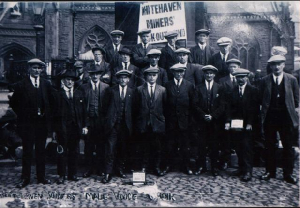 |
| On ‘lock-out’ tour, photo believed to have been taken outside St Nicholas’ Church in Durham City |
On November 29th 1923 a concert was given by the Choir In aid of Whitehaven Infirmary Bazaar Fund (Harbour Ward) at the Empire Theatre, when there was an excellent attendance. The entertainment consisted of vocal items by the Choir, assisted by well known local artistes. The fine renderings given by the Choir were well appreciated, conducted by Councillor Thompson Reed. The outstanding singer of the evening was Miss L McCusker of Cleator Moor.
Interestingly, on that occasion the Choir sang ‘Comrades In Arms’, which our present Choir also sing.
Reports of the concert appeared in both the Whitehaven News on November 29th and the West Cumberland Times on December 23rd.
On March 20th 1924 the following article appeared in the local press. The special preacher was Mr Rowe of Whitehaven. In the afternoon a sacred concert was given by the Whitehaven Miners’ Male Voice Choir.
Sadly, the following article from March 20th 1924 when a concert was given to the inmates of the Whitehaven Poor Law Institute, is the last evidence our present Choir historian has of the Whitehaven Miners’ Male Voice Choir. Mr Joe Dryden was by then the Choir Chairman.
In the future our historian plans to research Whitehaven’s Male Voice history even further.
My Son
Come now, me little lad
and sit you on my knee,
I’ll tell you all about your Dad,
a fine man was he.
A miner in the pits he was,
a hewer of the coal.
It’s a shame me little lad, your Dad you’ll never know.
It happened in the springtime, in the month of May,
your Dad went off to Wellington, as he did most every day.
He kissed me, aye he’d ne’er forget,
he gave me face a pat,
t’was the last time that I saw him
He never did come back.
It was on a chair, I sat me down,
Just as I sit with you,
there came a distant rumbling,
the noise it grew and grew.
I got me up, ran out the house,
I’d not done me hair.
Yet deep inside I felt the pain,
the pain that comes with fear.
Well I ran down to the colliery,
me and others too
and when we saw the looks upon their faces,
then we knew.
They tried, they tried, but all in vain,
those stricken lads to save.
But 136 miners lay in that cold black grave.
There were never so many tears as was shed in this town,
husbands, sons, sweethearts too
all, they were struck down.
From Kings and Queens and palaces,
they all sent sympathies.
But I thank the Lord for you me lad,
and me memories.
Whitehaven Male Voice Choir – A New Beginning
A Workington church choir singing at Whitehaven’s Twenty-Seventh Musical Festival in May 1977 was listened to with deep appreciation by a member of the Festival committee. This member was Ronald Corless, and the choir’s performance left a deep impression on him. So much so, that later in the evening, he remarked to Baxter Shaw, a very well known local musician and singer that a choir of similar quality was needed at Whitehaven, to participate in festivals, and such like events. Mr Shaw agreed, and both remarked that whilst a mixed choir would be a fine thing, a male voice choir would evoke something really exciting in the way of musical sound. Mr Shaw was willing to be a Musical Director of a male voice choir, if Mr Corless could enlist local singers to form it. At the festival the next evening, Mr Corless contacted several singers, who were enthusiastic about the new venture and willingly promised their support.
During the week Ronald got in touch with more enthusiasts, until the number who had pledged support, was well into double figures. He also contacted Gillian Kerrush of ‘The News’ and in the following weeks paper an article appeared, dealing with the proposed formation of a male voice choir. The article refered to the conversation between Mr Shaw and Mr Corless and how from this talk, the idea of the choir came about.From this a new Whitehaven Male Voice Choir was born, and the rest as they say, is history……………..
